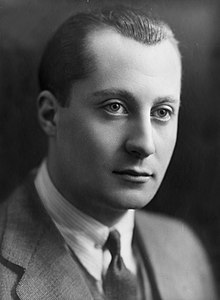José Primo de Rivera
|
The Most Excellent The Duke of Primo de Rivera, Marquis of Estella GE |
|
|---|---|

Primo de Rivera in 1934
|
|
| National Chief of the Falange Española de las JONS | |
|
In office 1934–1936 |
|
| Succeeded by | Manuel Hedilla |
| Member of the Congress of Deputies | |
|
In office 30 November 1933 – 7 January 1936 |
|
| Constituency | Cádiz |
| Personal details | |
| Born |
José Antonio Primo de Rivera y Sáenz de Heredia April 24, 1903 Madrid, Spain |
| Died | November 20, 1936 (aged 33) Alicante, Spain |
| Resting place | Valley of the Fallen (1959–) |
| Nationality | Spanish |
| Political party |
National Monarchist Union Falange Española (1933–1934) FE de las JONS (1934–1936) |
| Relations | Miguel Primo de Rivera (father) |
| Occupation | Lawyer, politician |
| Signature | |
José Antonio Primo de Rivera y Sáenz de Heredia, 1st Duke of Primo de Rivera, 3rd Marquis of Estella, GdE (April 24, 1903 – November 20, 1936), often referred to as José Antonio, was a Spanish lawyer, nobleman, politician, and founder of the Falange Española ("Spanish Phalanx"), later Falange Española de las JONS. He was the eldest son of military dictator Miguel Primo de Rivera. During the Spanish Civil War, he was accused of conspiracy and military rebellion against the Government of the Second Spanish Republic and was sentenced to death and executed during the first months of the war.
The image of José Antonio was revered during the war by the Nationalist faction and, after the establishment of Francoist Spain, he was regarded as a martyr, his figure being a tool of the Francoist propaganda apparatus. The inscription of "José Antonio ¡Presente!" could be found in many churches all across Spain.
José Antonio Primo de Rivera was born in Madrid on April 24, 1903, the eldest son of General Miguel Primo de Rivera, Prime Minister and Dictator under the monarchy of King Alfonso XIII of Spain. From his father he inherited the title of Marquis of Estella (in Navarre). He never married.
His mother died when he was five years old, and he was subsequently raised by his father's sister. He was privately taught at home, and learned English and French. When at university, he did not attend lectures until the second year of his undergraduate studies. He spent his summer holidays at the country estate of an uncle, where he practiced horse riding and hunting.
...
Wikipedia
